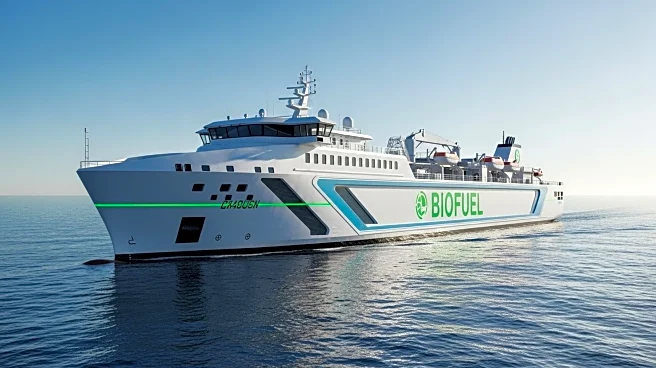What's Happening?
Nippon Yusen Kabushiki Kaisha (NYK) and the Global Centre for Maritime Decarbonisation (GCMD) have successfully completed a joint demonstration project, verifying the long-term use and storage of biofuel onboard ships. The six-month trial, known as Project LOTUS, involved the continuous use of B24 biofuel on a pure car and truck carrier. The tests showed no adverse effects on engine performance or fuel supply systems, and no signs of equipment wear or corrosion. Additionally, the fuel stored onboard remained within ISO 8217 standards without microbial contamination. B24 biofuel is a blend of 24% biodiesel, processed from used cooking oil and other feedstocks, and 76% very low sulfur fuel oil (VLSFO). The findings confirm that biofuel can serve as a drop-in fuel, compatible with existing ship infrastructure, supporting immediate adoption. The results have been published on GCMD’s website to aid industry operators evaluating biofuel.
Why It's Important?
The successful demonstration of biofuel's long-term safety and usability is a significant step towards decarbonizing the maritime industry. Biofuels offer a viable alternative to traditional fossil fuels, potentially reducing greenhouse gas emissions from shipping operations. This development supports the industry's shift towards more sustainable practices, aligning with global efforts to combat climate change. The ability to use biofuels without modifying existing ship infrastructure makes it an attractive option for immediate implementation, providing a practical pathway for shipping companies to reduce their carbon footprint. As the maritime industry seeks to meet international emissions targets, the adoption of biofuels could play a crucial role in achieving these goals.
What's Next?
Following the successful trial, NYK and GCMD are likely to continue promoting the use of biofuels within the maritime industry. The publication of the trial results on GCMD’s website aims to encourage other industry operators to consider biofuels as a sustainable option. As awareness and confidence in biofuel technology grow, more shipping companies may adopt biofuels, accelerating the industry's decarbonization efforts. Additionally, regulatory bodies may consider incentivizing the use of biofuels to further drive adoption and support environmental objectives.
Beyond the Headlines
The adoption of biofuels in maritime shipping not only addresses environmental concerns but also presents economic opportunities. As demand for biofuels increases, there could be growth in the production and supply chain sectors, potentially creating jobs and stimulating economic activity. Furthermore, the use of biofuels could lead to advancements in fuel technology and infrastructure, fostering innovation within the industry. Ethically, the shift towards sustainable fuels reflects a commitment to responsible environmental stewardship, aligning with broader societal values of sustainability and conservation.









